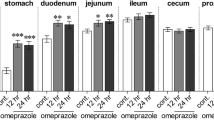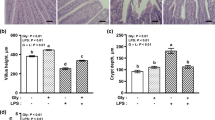Abstract
The aim of this study was to determine the effect of magnesium deficiency on small intestinal morphology and function. Rats were assigned to 4 groups and placed on magnesium sufficient or deficient diet for 1 or 3 weeks. Infiltration of neutrophils and mucosal injury were assessed in stained sections of small intestine. Magnesium deficiency alone induced a significant increase in neutrophil infiltration and increased vascular ICAM-1 expression, in the absence of changes in mucosal injury or expression of proinflammatory mediators. Magnesium deficiency was associated with hyposecretory epithelial cell responses and vascular macromolecular leak in the small intestine and lung, which was attributed partly to reduced expression of NOS-3. To determine the effect of hypomagnesmia on the intestinal responses to a known oxidative stress, groups of rats were randomized to either sham operation or superior mesenteric artery occlusion for 10 (non-injurious) or 30 (injurious) minutes followed by a 1- or 4-hour reperfusion period. In response to mesenteric ischemia/reperfusion, deficient rats showed exaggerated PMN influx, but similar mucosal injury. Intestinal ischemia in sufficient animals induced vascular macromolecular leak in the small intestine and lung at 4 hours of reperfusion, with levels similar to those observed in untreated deficient rats. Acute magnesium repletion of deficient rats 24 h before surgery attenuated the exaggerated inflammation in deficient rats. These data show that magnesium deficiency induced a subclinical inflammation in the small intestine in the absence of mucosal injury, but with significant functional changes in local and remote organs and increased sensitivity to oxidative stress.








Similar content being viewed by others
References
Dube L, Granry JC (2003) The therapeutic use of magnesium in anesthesiology, intensive care and emergency medicine: a review: [L’usage therapeutique du magnesium en anesthesiologie, reanimation et medecine d’urgence]. Can J Anesth 50:732–746
Noronha L, Matuschak G (2002) Magnesium in critical illness: metabolism, assessment, and treatment. Intensive Care Medicine 28:667–679
Tosiello L (1996) Hypomagnesemia and diabetes mellitus. A review of clinical implications. Arch Intern Med 156:1143–1148
Kahraman S, Ozgurtas T, Kayali H, Atabey C, Kutluay T, Timurkaynak E (2003) Monitoring of serum ionized magnesium in neurosurgical intensive care unit: preliminary results. Clinica Chimica Acta 334:211–215
Kramer JH, Mak IT, Phillips TM, Weglicki WB (2003) Dietary magnesium intake influences circulating pro-inflammatory neuropeptide levels and loss of myocardial tolerance to postischemic stress. Exp Biol Med (Maywood) 228:665–673
Weglicki WB, Phillips TM (1992) Pathobiology of magnesium deficiency: a cytokine/neurogenic inflammation hypothesis. Am J Physiol 263:R734–R737
Weglicki WB, Bloom S, Cassidy MM, Freedman AM, Atrakchi AH, Dickens BF (1992) Antioxidants and the cardiomyopathy of Mg-deficiency. Am J Cardiovasc Pathol 4:210–215
Wiles ME, Wagner TL, Weglicki WB (1997) Effect of acute magnesium deficiency (MgD) on aortic endothelial cell (EC) oxidant production. Life Sci 60:221–236
Moore FA, Haenel JB, Moore EE, Whitehill TA (1992) Incommensurate oxygen consumption in response to maximal oxygen availability predicts postinjury multiple organ failure. J Trauma 33:58–65
Rehrig S, Fleming SD, Anderson J, Guthridge JM, Rakstang J, McQueen CE, Holers VM, Tsokos GC, Shea-Donohue T (2001) Complement inhibitor, complement receptor 1-related gene/protein y-Ig attenuates intestinal damage after the onset of mesenteric ischemia/reperfusion injury in mice. J Immunol 167:5921–5927
Stojadinovic A, Kiang J, Smallridge R, Galloway R, Shea-Donohue T (1995) Induction of heat-shock protein 72 protects against ischemia/reperfusion in rat small intestine. Gastroenterology 109:505–515
Ward DT, Lawson SA, Gallagher CM, Conner WC, Shea-Donohue T (2000) Sustained nitric oxide production via l-arginine administration ameliorates effects of intestinal ischemia-reperfusion. J Surg Res 89:13–19
Hernandez LA, Grisham MB, Twohig B, Arfors KE, Harlan JM, Granger DN (1987) Role of neutrophils in ischemia-reperfusion-induced microvascular injury. Am J Physiol 253:H699–H703
Bienvenu K, Hernandez L, Granger DN (1992) Leukocyte adhesion and emigration in inflammation. Ann NY Acad Sci 664:388–399
Grisham MB, Hernandez LA, Granger DN (1986) Xanthine oxidase and neutrophil infiltration in intestinal ischemia. Am J Physiol 251:G567–G574
Kubes P, Hunter J, Granger DN (1992) Ischemia/reperfusion-induced feline intestinal dysfunction: importance of granulocyte recruitment. Gastroenterology 103:807–812
Hayward R, Lefer AM (1998) Time course of endothelial-neutrophil interaction in splanchnic artery ischemia-reperfusion. Am J Physiol Heart Circ Physiol 275:H2080–H2086
Mak IT, Komarov AM, Wagner TL, Stafford RE, Dickens BF, Weglicki WB (1996) Enhanced NO production during Mg deficiency and its role in mediating red blood cell glutathione loss. Am J Physiol 271:C385–C390
Mak IT, Dickens BF, Komarov AM, Wagner TL, Phillips TM, Weglicki WB (1997) Activation of the neutrophil and loss of plasma glutathione during Mg-deficiency–modulation by nitric oxide synthase inhibition. Mol Cell Biochem 176:35–39
Tavaf-Motamen H, Miner TJ, Starnes BW, Shea-Donohue T (1998) Nitric oxide mediates acute lung injury by modulation of inflammation. J Surg Res 78:137–142
Bussiere FI, Gueux E, Rock E, Mazur A, Rayssiguier Y (2002) Protective effect of calcium deficiency on the inflammatory response in magnesium-deficient rats. Eur J Nutr 41:197–202
Mak IT, Komarov AM, Kramer JH, Weglicki WB (2000) Protective mechanisms of Mg-gluconate against oxidative endothelial cytotoxicity. Cell Mol Biol (Noisy -le-grand) 46:1337–1344
Murphy E, Steenbergen C, Levy LA, Raju B, London RE (1989) Cytosolic free magnesium levels in ischemic rat heart. J Biol Chem 264:5622–5627
Mak IT, Stafford R, Weglicki WB (1994) Loss of red blood cell glutathione during Mg deficiency: prevention by vitamin E, D-propranolol, and chloroquine. Am J Physiol 267:C1366–C1370
Bussiere FI, Tridon A, Zimowska W, Mazur A, Rayssiguier Y (2003) Increase in complement component C3 is an early response to experimental magnesium deficiency in rats. Life Sci 73:499–507
Kubes P, Ward PA (2000) Leukocyte recruitment and the acute inflammatory response. Brain Pathol 10:127–135
Fleming SD, Starnes BW, Kiang JG, Stojadinovic A, Tsokos GC, Shea-Donohue T (2002) Heat stress protection against mesenteric I/R-induced alterations in intestinal mucosa in rats. J Appl Physiol 92:2600–2607
Anderson J, Fleming SD, Rehrig S, Tsokos GC, Basta M, Shea-Donohue T (2005) Intravenous immunoglobulin attenuates mesenteric ischemia-reperfusion injury. Clin Immunol 114:137–146
Sato N, Kozar RA, Zou L, Weatherall JM, Attuwaybi B, Moore-Olufemi SD, Weisbrodt NW, Moore FA (2005) peroxisome proliferator-activated receptor gamma mediates protection against cyclooxygenase-2-induced gut dysfunction in a rodent model of mesenteric ischemia/reperfusion. Shock 24:462–469
Wallace JL, Devchand PR (2005) Emerging roles for cyclooxygenase-2 in gastrointestinal mucosal defense. Br J Pharmacol 145:275–282
Blikslager AT, Roberts MC, Rhoads JM, Argenzio RA (1997) Prostaglandins I2 and E2 have a synergistic role in rescuing epithelial barrier function in porcine ileum. J Clin Invest 100:1928–1933
McCafferty DM, Mudgett JS, Swain MG, Kubes P (1997) Inducible nitric oxide synthase plays a critical role in resolving intestinal inflammation. Gastroenterology 112:1022–1027
Miner TJ, Tavaf-Motamen H, Stojadinovic A, Shea-Donohue T (1999) Ischemia-reperfusion protects the rat small intestine against subsequent injury. J Surg Res 82:1–10
Chen Y, Lui VCH, Rooijen NV, Tam PKH (2004) Depletion of intestinal resident macrophages prevents ischaemia reperfusion injury in gut. Gut 53:1772–1780
Fleming SD, Mastellos D, Karpel-Massler G, Shea-Donohue T, Lambris JD, Tsokos GC (2003) C5a causes limited, polymorphonuclear cell-independent, mesenteric ischemia/reperfusion-induced injury. Clin Immunol 108:263–273
Fleming SD, Shea-Donohue T, Guthridge JM, Kulik L, Waldschmidt TJ, Gipson MG, Tsokos GC, Holers VM (2002) Mice deficient in complement receptors 1 and 2 lack a tissue injury-inducing subset of the natural antibody repertoire. J Immunol 169:2126–2133
Lawson S, Ward DT, Conner C, Gallagher C, Tsokos G, Shea-Donohue T (2002) Diabetic hyperglycemia: a facilitating factor in systemic capillary leak. J Surg Res 105:95–101
Acknowledgements
This work was supported by NIH grants National Institutes of Health grants R01-HL-62282 and HL-65718 awarded to W.B.W. and AI 49316 to TSD, and USDA CRIS project #1235-52000-055. The opinions and assertions in this article are those of the authors and do not necessarily represent those of the U. S. Department of Defense or the U. S. Department of Agriculture.
Author information
Authors and Affiliations
Corresponding author
Additional information
The opinions contained herein are those of the authors and are not to be construed as official policy or reflecting the views of the Department of Defense
Rights and permissions
About this article
Cite this article
Scanlan, B.J., Tuft, B., Elfrey, J.E. et al. Intestinal inflammation caused by magnesium deficiency alters basal and oxidative stress-induced intestinal function. Mol Cell Biochem 306, 59–69 (2007). https://doi.org/10.1007/s11010-007-9554-y
Received:
Accepted:
Published:
Issue Date:
DOI: https://doi.org/10.1007/s11010-007-9554-y




